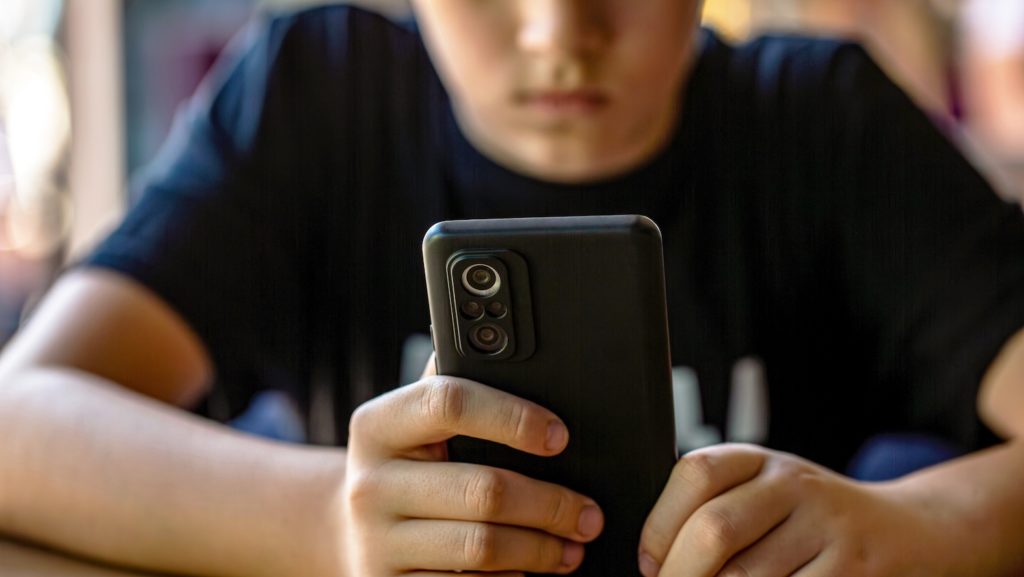Worried your kids are spending too much time on their smartphones? Beyond the time-wasting concerns, recent studies show frequent smartphone usage is linked to mental health issues, addiction and more.
Clare Morell, a mom and fellow at the Ethics and Public Policy Center where she directs EPPC's Technology and Human Flourishing Project, contends that it is possible to keep your children away from harmful technology. OSV News' Charlie Camosy spoke with Morell, author of "The Tech Exit: A Practical Guide to Freeing Kids and Teens from Smartphones," about the harms of smartphone usage and what concerned parents can do about it.
Charlie Camosy: There has been a lot of talk, for a very long time, about "technology and children." Can you give us a very general and big-picture summary about what is happening? Where are we right now?

Clare Morell: What we are facing right now with technology and children we have never seen before in human history. Children have super computers in their pockets 24/7 with constant access to the internet, and not just the internet but thousands of apps, many of which are run by aggressive algorithms seeking to addict children.
Because of smartphones and social media, predators and bad actors have never had easier access to our children. And other dangerous content, like pornography, has never had easier access to our children. Children don't need to go looking for pornography, it finds them on social media.
The average age of having a first smartphone is now around 11 years old. And this smartphone-based childhood is not working out for our kids.
The rates of mental health problems in our youth have skyrocketed over the last several years. Last year, one in three high-school aged women seriously considered death by suicide. The rates of teen depression, anxiety, self-harm and suicide have all increased exponentially.
These technologies are also leading to divergent brain development in children over time, according to a study by the University of North Carolina in 2023. And other studies explain why, indicating that social media acts on the brain like a highly addictive drug.
In sum, smartphones and social media are incredibly addictive technologies, especially to the developing brains and nervous systems of children, that harm their health and development and over time desensitize them to the pleasures of the real world.
These new technologies of smartphones and social media are harming our kids and despite being more "connected" than ever online, children are suffering from an epidemic of loneliness. Instead of talking to each other, kids are all hunched over their own screens.
Camosy: Some parents may feel safe based on the concept of "parental controls." Can you say something about why you are skeptical about such controls?
Morell: Parental controls are a myth because they don't give parents real control over what a child is seeing or doing in the online apps.
Social media companies have worked to convince parents that if they just enable the parental controls on their apps, their children will be safe. Instagram, along with many of the other major social media platforms like Snapchat, TikTok and Discord, offers "parental supervision" tools, but a teen can cancel it at any time (though the parent will get a notification if it's canceled).
And even that supervision is extremely limited. The controls mainly allow a parent to set daily time limits and breaks, and manage privacy settings and content restrictions, but the parent has no insight into posts in the child's feed or the content of messages sent and received.
Even more frustrating, if a parent installs third-party controls or filters, many apps, like Snapchat, TikTok and Discord, all block external controls. Parents are flying blind when it comes to social media.
Filters also fall short when it comes to app-based devices. They don't always work to block sites accessed inside apps (via in-app browsers). Parents share that even the good apps have back doors that filters don't catch.
One mom recounted how her son ironically used a parental monitoring app on his phone to access porn through the app's Support button browser. That's only one example of the many loopholes in filters.
Camosy: OK, folks need to read the book for the full case, but what do you think are better practices for parents?
Morell: What I argue for in "The Tech Exit" is that a total exit from smartphones and social media during childhood, through the teen years is necessary. And not only is it necessary, but it is possible and fundamentally positive.
I walk parents through the practical steps to successfully keep smartphones out of childhood and instead show families all the positive goods of the real world that childhood can be filled with instead.
"The Tech Exit" is a positive no, because saying no to smartphones is saying yes to so much more in the real world. I would encourage parents, especially of teens, to adopt alternative phones to smartphones, like the Wisephone, Pinwheel phone, Gabb phone or Bark phone.
And to trade screens for real-world responsibilities and freedoms, allowing children to take on more adult-like tasks around the home and then in their communities like first jobs mowing lawns or babysitting or volunteering, and allowing also as children age more independence of movement in the real world. These real-world responsibilities and freedoms help children progress towards adulthood, building the skills and resilience they need, whereas screens stunt that progress.
And helping children to experience the pleasures and satisfactions of the real world and real-life relationship makes them lose their taste for the cheap digital substitutes of screens.
Camosy: Catholic social teaching insists that, as important as such personal and familial practices are, much of this problem is bigger: social, structural. How can we respond to the problem on these levels?
Morell: Parents will always be on the frontlines, but many aspects of the harms from social media and smartphones are collective in nature and so they require collective solutions.
For example, social media and smartphones create negative social dynamics for the entire peer group, where even if a few children are using these technologies it negatively impacts the social environment for everyone else. That's a collective problem.
Another example, is that in the smartphone-era any child can pull up a pornography website and stick it in another child's face, that's another problem that is bigger than individual parents.
Schools and lawmakers can help provide the collective solutions that parents need to back them up. Many schools are now banning smartphones from bell-to-bell, including entire states and school districts. Phone bans create a school social environment that is free of the influence of smartphones and social media, which make it easier for individual families to opt out of these technologies.
Lawmakers can help parents by passing laws to age restrict social media out of childhood entirely, like Australia has done and the state of Florida has done in part (banning social media for children under 14 years old). This provides a collective solution so that individual parents don't have to fight the battle to keep their child off of social media, it becomes a non-option for all children.
Another critical legal solution that parents need are age-verification laws for pornography websites. 24 states have now passed such laws and the Supreme Court ruled recently in Free Speech Coalition v. Paxton that Texas's age-verification law is constitutional, giving a clear path forward for states to legislate in this way.
Age-verification laws mean that if a child accidentally stumbles across a link on social media they won't be able to click through to its obscene content, and now another child can't pull up PornHub and show it to my child. They'd be blocked unless they can prove they're an adult. This is a huge win for protecting kids online and backing parents up. I hope more is to come.

